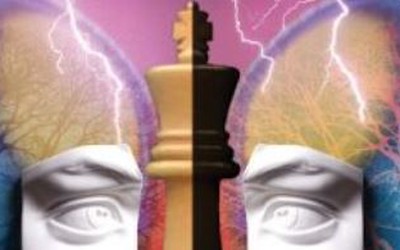
Chess Life, April 1966, as given in Edward Winter's Chess Notes
Review: Spassky's Best Games
Games (and bio) of lesser-studied world champions part 2Spassky's Best Games: A Chess Biography
by Alexey Bezgodov and Dmitry Oleinikov
New in Chess 2023, paperback, 289 pages
Sample material available in pdf via the publisher's website
Boris Spassky: 'Soviet dandy'
In My Great Predecessors (Part One, 2003) Garry Kasparov wonderfully characterizes the tenth world champion as ‘a kind of Soviet dandy’. As this paradox suggests, Boris Spassky is an enigmatic figure. The enigma stems partly from an omission that is exceptional among world champions: Spassky never published an autobiography or his own collection of annotated games. We have to make do with a few interviews and the games he annotated, many of them scattered across the Soviet chess press (some are collected here and here on Douglas Griffin's brilliant site, to which I give further links below). As he is now aged 87, it would seem unlikely that a book by Spassky is forthcoming. Spassky's Best Games seeks to fill that gap. Of the two Russian authors, GM Bezgodov is the principal annotator, while the journalist Oleinikov contributed the biography.
Another factor in Spassky's enigma is his self-confessed ‘laziness’. This was most tangible in his refusal to prepare for the 1972 ‘Match of the Century’ with Fischer according to Soviet expectations. As a junior I enjoyed reading Svetozar Gligoric’s book of the 1972 match, which began with the previous encounters between Spassky and Fischer. These games gave the impression of steadily rising tension, not indolence. But something changed once Spassky ascended the throne. By the 1980s, the disappointing runs of quick draws in his tournament games suggested a lack of motivation, from which he was only occasionally roused to produce a brilliancy.
A tennis enthusiast but also a heavy smoker, was Spassky unusually robust or rather fragile? His career in the exhausting Candidates cycle lasted decades, but by 1982 his success was taking a severe physical toll: 'in order to win the decisive game against Seirawan, he had to smoke and drink a lot of coffee, and as a result, on his way to his hotel room, he fainted and struck his head on the marble floor' (Spassky's Best Games, p. 129). Different times.
The book
Timman’s book on Euwe in this New in Chess series (see my review here) concentrates on games and minimizes the life story, partly because a comprehensive biography of Euwe already exists. Spassky’s case is very different, and the first half of Spassky’s Best Games consists of a biography. The second half presents 61 games annotated by Bezgodov, GM Dmitry Kryakvin and the book's translator FM Steve Giddins (in that order of quantity). The main content is ushered in by forewords from Kasparov and Kramnik, and complemented by photos, a bibliography, and an index of names. I wished for a list of games that would enable the reader to see the opponents at a glance.
The biography
Oleinikov's biography focuses closely on Spassky's relationships with his trainers, notably Zak, Tolush and Bondarevsky. It also shows how acute a psychologist Spassky was. His success in match play owed much to his ability to generate the kind of game that would be least comfortable for his opponent. Geller disliked defending, so Spassky played the Closed Sicilian, abandoned his queenside and threw his kingside pawns forward. Petrosian proved surprisingly at home in tactical skirmishes, so Spassky subjected him to a 'bear-like' squeeze. Likewise, we often witness Spassky’s pragmatic ability to make a speculative sacrifice when he sensed that the opponent’s energy level (or clock time) was too low to resist effectively.
The biography is always readable and sometimes gripping. If it doesn't feel definitive, that is mainly because direct insight into Spassky's inner life is understandably lacking. More avoidable problems are that the sources of quotations are not cited, and that the game fragments sometimes needed a little more explanation. Andrew Soltis's Tal, Petrosian, Spassky and Korchnoi: A Chess Multibiography with 207 Games (McFarland, 2019) is absent from the bibliography. (Edward Winter provides a substantial list of Spassky sources.) Soltis's book has different strengths and emphases: for example, Soltis takes greater interest than Oleinikov in Spassky's childhood sufferings in Leningrad.
In the final pages, Oleinikov refrains from any political comment or speculation regarding Spassky's return from France to Moscow and the Russian Chess Federation around a decade ago; the biography concludes on a resolutely positive note.
The annotated game collection
Selecting just 61 Spassky games is a difficult task, but still the offering appears a bit arbitrary. For example, there are just two games apiece from the two great matches, the 1969 defeat of Petrosian and the 1972 loss to Fischer.
The annotations are of mixed quality. A couple of sub-optimal examples:
Spassky-Lutikov, Moscow 1960, began 1 d4 d5 2 Nc3, and the comment is: 'This is unlike Spassky and maybe the game score is incorrect'. On the contrary, a quick database search reveals that Spassky experimented with the Veresov Attack in several important games.
In Game 4, against Antonio Medina Garcia, Spassky is credited with a beautiful and 'shocking' two-pawn sacrifice, yet in Spassky's own notes to this game he confesses that it was a basic oversight. A little more research can change the story of a game.
Another curiosity is that the famous King's Gambit Spassky-Bronstein, USSR Championship (Leningrad) 1960, has been annotated in greater detail by Giddins himself in The Most Exciting Chess Games Ever - another New In Chess publication. Could the publisher have joined up the dots better?
Finally, the 'lessons' that conclude each game are hit-and-miss: while some convey real insight, others seem to be filler.
Conclusion - comparing other Spassky collections
Although I enjoyed and can cautiously recommend this collection, readers wishing for practical lessons from Spassky's games might prefer one of the following:
Zenon Franco's Spassky Move by Move (Everyman 2016)
Mihail Marin's databaseLearn from Spassky (Modern Chess 2020).
Those who want a definitive Spassky collection, on the other hand, will want this:
Tibor Karolyi's Boris Spassky's Best Games 1 - 1948-68, The Rising Star (Quality Chess 2024), with volume 2 to follow.
Karolyi's work will surely supersede older collections such as Kasparov's My Great Predecessors Volume 3 or Bernard Cafferty's classic Spassky's 100 Best Games.
The multi-volume Karolyi route is admittedly demanding for readers/consumers: for the Hungarian IM's notes to the 1972 world championship match with Fischer (and the 1992 rematch) we have to acquire yet another volume. So despite all these options, Bezgodov and Oleinikov's manageably-sized book is an attractive compromise choice for a reader curious about Spassky - as everyone interested in 20th-century chess is bound to be.
More blog posts by Minckwitz

Review: Max Euwe's Best Games by Jan Timman
Games of lesser-studied world champions part 1
Review: The Perfect Pirc-Modern by Viktor Moskalenko
This is a review by FM James Vigus of Moskalenko's The Perfect Pirc-Modern
Review: Some instructional and training works
Review by FM James Vigus of recent training/calculation books